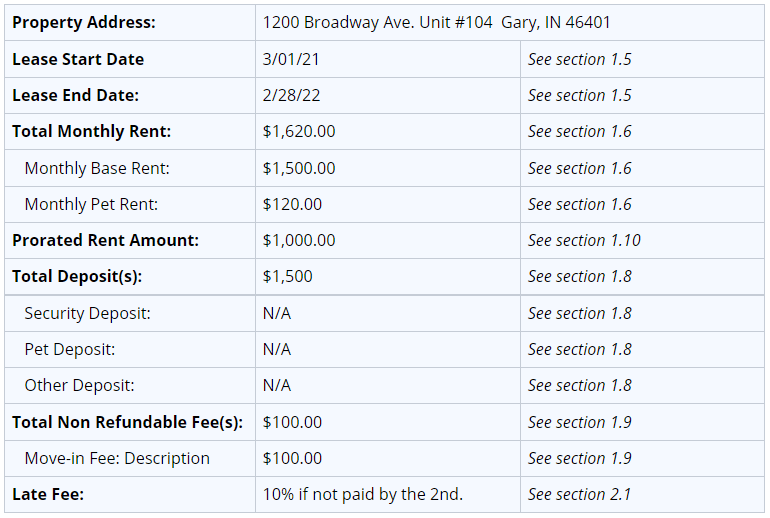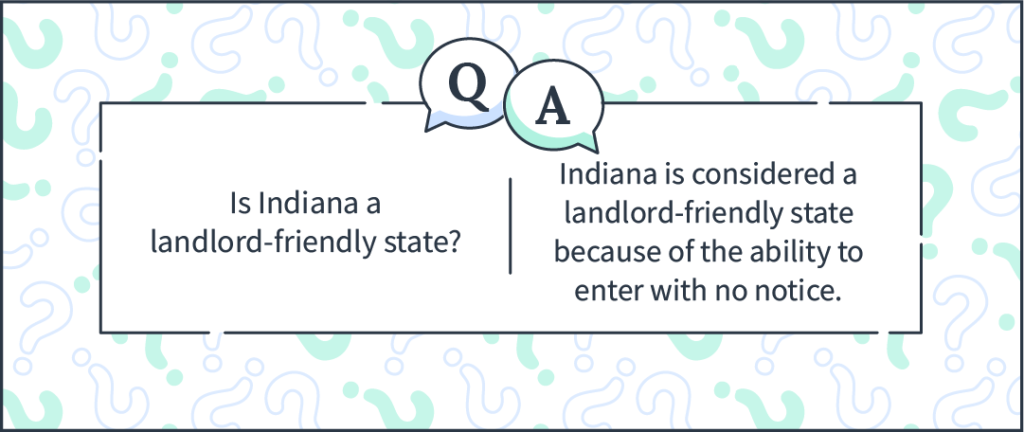Table of Contents
- Indiana Renters’ Rights and Landlord Responsibilities
- Indiana Landlords’ Rights and Tenant Responsibilities
- Application Fees
- Criminal Background Check
- Required Lease Disclosures
- Indiana Lease Agreement Sample
- Indiana Landlord-Tenant Law FAQ
- Due Diligence and Indiana Rental Laws
- Indiana Landlord-Tenant Law Resources
For those looking to invest in real estate, Indiana should also be on the top of their list. The job market is booming, the cost of living is low, and there is a low crime rate.
Laws that impact the rental market, landlords, and tenants are constantly being decided in states. Make sure you know what’s on your ballot – find Indiana voting information.

Indiana Renters’ Rights and Landlord Responsibilities
Must return security deposit within 45 days
30-day notice required before raising rent
No notice required before entering the property
Required to make repairs within a reasonable time frame
When it comes to Indiana rental laws, there are a few specifics landlords need to know:
- Security Deposit – Indiana law does not limit the amount a landlord may charge for the security deposit. Landlords must return the deposit within 45 days of the tenant moving out.
- Raising Rent – Landlords in Indiana may increase the rent to any amount with a 30-day notice.
- Notice of Entry – Outside of emergencies, Indiana landlords must give “reasonable notice” before entering the unit, which is deemed to be 24 hours notice.
- Repairs – It is the landlord’s responsibility to keep the rental in safe and healthy living conditions. If the landlord fails to do so, the tenant may deliver them a written notice of what needs to be repaired or replaced. The landlord must make the repairs within a reasonable timeframe, though the exact time is not specified by law. If they fail to do so, the tenant may make the repairs themselves and deduct the cost from their next rent payment.
Indiana Landlords’ Rights and Tenant Responsibilities
- Tenants have 10 days to pay rent after they receive a written notice
- Must give a three-month notice before terminating a lease
- Tenants must keep the property clean and make small repairs
- Overdue Rent – If a tenant fails to pay rent on time, the landlord must give them a 10-day notice to pay or quit. If the tenant fails to pay, the landlord may file for eviction.
- Terminating a Lease – If a tenant needs to terminate a month-to-month lease, they must give the landlord a three-month notice.
- Tenant Responsibilities – Tenants are required to keep the property clean and not disturb neighbors.
Application Fees
Indiana does not cap application fees.
Criminal Background Check
- HUD (Federal) laws do not classify criminal backgrounds as a protected class, but making a decision to rent based off a criminal background alone could lead to a discrimination charge as it impacts certain protected groups of people disproportionately.
- However, if the criminal background check revealed a crime for the manufacture and distribution of drugs, homicide and/or stalking, denying the application is allowed.
- Landlords should have a consistent and equal policy or procedure in place to follow regarding criminal background checks so as not to discriminate against one class of people over another.
- HUD states that a landlord cannot ask about arrest records, only convictions, as innocent people are commonly arrested though the situation may not have resulted in a conviction.
- Some municipalities may have written their own laws expanding onto what you can and cannot ask regarding criminal backgrounds during the tenant screening process.
Required Lease Disclosures
Landlords must disclose the property’s flooding risk in the lease if it’s located on a floodplain. This applies when the lowest floor (including basement) is at the 100-year frequency flood elevation.
Build an Indiana lease in 15 minutes or less
Indiana Lease Agreement Sample
There are three sections to a residential lease agreement. The first section outlines the custom details of the contract, such as who’s involved and for what address. Here’s an example Indiana lease agreement listing details found in Section 1:
Indiana Landlord-Tenant Law FAQ
Below are answers to some of the most commonly-asked questions when it comes to landlord-tenant laws in Indiana:
Can You Withhold Rent in Indiana?
Renters are able to withhold rent if a landlord fails to make necessary repairs.
How Long Does it Take to Evict a Tenant in Indiana?
Evicting a tenant in Indiana typically takes anywhere from three weeks to four months, depending on the reason for eviction.
Is Indiana a Landlord-Friendly State?
Indiana is considered a landlord-friendly state because of the lack of rent control laws and the ability to enter with no notice.
What is the Eviction Process in Indiana?
There are four reasons a landlord may file for eviction in Indiana. The four reasons include failure to pay rent, violation of the lease agreement, end of lease term, and illegal activity. Depending on the violation, the landlord must give the tenant notice and anywhere from 10 to 45 days to cure their violation.
If the tenant fails to cure or quit, then the landlord may file a complaint with the court, which costs $97. After the complaint is filed, it will be served to the tenant within five to 20 days. The type of eviction will determine when the hearing will be held.
If the court rules in favor of the landlord, then a writ of execution will be issued anywhere from a few hours to a few days after the ruling. The tenant will have to move out within 48 to 72 hours upon being served the writ of execution depending on the eviction.
How Much Notice Does a Landlord Have to Give a Tenant to Move Out in Indiana?
Landlords must give a 30-day notice before asking a tenant to vacate the property. If the landlord is asking them to move out because of a lease violation, they only need to give the tenant a 10-day notice.
Due Diligence and Indiana Rental Laws
TurboTenant has utilized many municipal sources, along with official state statutes, in order to compile this information to the best of our ability. However, local laws are always in flux, and landlords and tenants alike should do their due diligence and consult legal help when it’s needed. We hope the following list can serve as a valuable resource and allow you to succeed as a landlord or tenant in Indiana. Be sure to take proper precautions when it comes to finding the top candidates for your unit by utilizing our online rental application and tenant screening services.
Disclaimer: TurboTenant, Inc does not provide legal advice. This material has been prepared for informational purposes only. All users are advised to check all applicable local, state, and federal laws, and consult legal counsel should questions arise.

Unlimited Everything.
Create a single Indiana lease agreement, or subscribe and receive unlimited lease agreements, landlord forms pack, and e-signs for a simple annual fee. Be confident with all the legal forms and tools you need as a professional landlord.
Discover Our Unlimited PlanIndiana Landlord-Tenant Law Resources
- IHCDA: Renter’s Rights
- Indiana Code Title 32, Article 31 (2019) – Landlord-Tenant Relations
- Indiana Landlord and Tenant Duties – National Conference of State Legislatures
Indiana Fair Housing Resources
- Indiana Civil Rights Commission Fact Sheet
- Indiana Civil Rights Commission – Housing
- Tenant Rights, Laws and Protections: Indiana – HUD
- HUD in Indiana
Other State Resources
Indiana Associations
Indiana City-Specific Housing Resources
Indianapolis
- Know Your Rights: Protecting Yourself as a Tenant in Indiana – Indiana University
- Fair Housing Center of Central Indiana
- Off Campus Living Resources – Indiana University
- Mid-Indiana Board of REALTORS®
Fort Wayne
- If You’re a Tenant – City of Fort Wayne
- Frequently Asked Questions – City of Fort Wayne
- Upstate Alliance of REALTORS®
Evansville
South Bend
- Landlord-Tenant Responsibilities and Rights
- Rental Safety Verification Program – South Bend, Indiana
- Housing Discrimination – City of South Bend
- Greater South Bend – Mishawaka Association of REALTORS®
Fishers
Bloomington
- For Landlords – City of Bloomington
- For Renters – City of Bloomington
- Landlord/Tenant Legal Question
- Bloomington Board of REALTORS®
Hammond
- Rental Registration – City of Hammond
- Housing Discrimination Information – City of Hammond
- Fair Housing Brochure – City of Hammond
- Greater Northwest Indiana Association of REALTORS®
Gary
West Lafayette
Federal Fair Housing Resources








